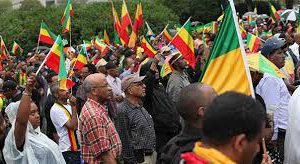
BY EPHREM ANDARGACHEW
With more than 110 million people Ethiopia stands as the second-most populous country in Sub Saharan Africa. Youth represent the vast majority of the population, according to different statistics. In the same way, as at home, there are also tens of thousands of youth in various parts of the world.
Following the mid-2018 reform, Ethiopian Prime Minister Abiy has extended the message to Ethiopian youth and children in the Diaspora to actively participate in the issue of their country. He wrote that “Ethiopia is experiencing a resurrection of hope. Hope that you have fought for it from a distance. Hope that you and your parents, near and far, have prayed for you. Hope that you held on to me even when at times it seemed impossible. You held an enduring love and an unwavering faith in the possibilities of Ethiopia being a great nation. You never lost sight of the light that leads to hope”.
Further, “you dressed up and flaunted your Ethiopian identity at your school’s international day celebration; you hosted Ethiopia day and, proactively engaged in policies of your host nations that may concern the betterment of Ethiopia. You proudly held up Ethiopia’s flag wherever you could and defended your country’s glorious history. It is my wish you continue sharing in your various spheres of influence all that makes Ethiopia great”.
This statement explicitly indicates that the contribution of the diaspora has been valued and been given due emphasis in Ethiopia. Particularly, on September 4, 2019, the annual meeting of Ambassadors, Heads of Missions, and Officials of the Ministry of Foreign Affairs of the Federal Democratic Republic of Ethiopia are underway under the theme “Institutional Reform for Diplomatic Excellence.” In this meeting, the ambassadors set citizen-centred diplomacy as one of the priority areas they should engage in. Since citizens are the optimum capital and great asset of a nation the diplomatic efforts should centre on citizens and dealing with the cases of citizens regardless of their identity, religion, or political stance.
Ethiopian Diaspora Agency Communication Director Wondosen Girma told the Ethiopian Herald that Ethiopian youth diaspora across the world, taking the efforts of the government into account, have shown their commitment in various times and situations. They have been participating per their ability, capacity, educational background, and so on.
According to Ethiopian Ministry of Foreign Affairs Spokesperson Ambassador Dina Mufti, modern and advanced platforms allow every diaspora including especially the youth to participate and contribute their share to their country. They have used Information communication technology and internet facilities to influence and uncover the truth regarding their country.
Modern technologies have played a critical role and allow the diasporas to guard the national interest of their country. Currently, states of the world especially, United States, Canada, Sweden, New Zealand, Britain, France, Germany, Turkey, Spain, South Korea, Switzerland, Japan, Singapore, Norway, and Russia have been successful in digital diplomacy.
Ethiopian Diaspora Agency Director-General Selamawit Dawit told The Ethiopian Herald that currently, the Ethiopian diasporas by using modern technologies have significantly contributed to their country. Further, they have been committed in safeguard their country’s national interest using social media, especially, tweeter campaigns.
The diaspora communities’ participation in digital diplomacy indeed increases the contribution of youth diaspora. Besides, their firm stance against foreign interventions and influence has brought various results, she underlined.
Previously, there was a misunderstanding that those diasporas who participate in the issue of the country only coming from Europe or America. Nevertheless, the participation of the Ethiopian diaspora from the Middle East and Africa has changed the misconception which existed for a long, according to Wondwosen.
Unlike the previous diplomatic practice, diasporas in the Middle East are working hard to protect the rights and interests of their country in languages that have never been seen or used before, especially in the Arabic language. Besides, diasporas in South Africa, Kenya, and so on have joined the Twitter campaign regarding the Great Ethiopian Renaissance Dam (GERD), the current situation of the country, and the like, he explained.
Digital media has become an essential tool of digital diplomacy. This worldwide hold of online channels has brought with it a wave of openness and transparency that has never been experienced before.
Social media offer a platform for unrestricted communication and have become a communicator’s most dominant device. There is a wide range of social media that international actors use, nevertheless, the most popular ones are Twitter, Facebook, Instagram, YouTube, Periscope, and Snapchat. It is no longer in doubt that digital tools have changed the character of diplomacy and the manner of communicating in the diplomatic arena.
Those Ethiopians who live abroad have used social media as a tool for digital diplomacy to counterbalance foreign intervention and influences. The commitment of the Ethiopian diasporas once acknowledges by Prime Minister Abiy Ahmed. “There are diasporas who have been working more than ambassadors and diplomats without demanding any money from their country. Their commitment, struggle, and exertion to their country shine from the work of some ambassadors’ and diplomats”.
The contribution of Ethiopian diasporas has indeed been observed since July. According to Selamawit, over the past three months, the Ethiopian diaspora has been able to launch more than 500 messages on Twitter to make the international community aware of the current situation in Ethiopia. The participation and contribution of youth diasporas, in this Twitter campaign, have been enormous.
The availability of modern digital platforms and Covid-19 have changed the practice of classical diplomacy into digital diplomacy. Hence, digital diplomacy has become common practice in every nation including Ethiopia. Additionally, the role of Ethiopian diasporas’ youth through digital diplomacy is significant since the government has downsized embassies, Wondosen added.
Apart from their commitment, Ethiopian diaspora youth are close to social media technologies and easy to use. They can also use the language of the countries in which they live makes it easier for them to engage in digital diplomacy. It is easy for them to explain Ethiopia’s interest in uncovering the truth. So far, they have revealed so much fake news and stories which stand against Ethiopian national interest, he said.
Ethiopia is on the verge of establishing a new government that was elected via popular vote. So it is time for the Ethiopian diaspora particularly, youth diasporas to maximize their efforts. Their contributions need to be stronger than ever.
London elucidated that Ethiopian youth diasporas need to carry on what they have already started via digital diplomacy. The country expects a lot from them. They need to help the new government with their knowledge, resources, technology which are useful to their nation while the government has to facilitate and focus on issues that unite the diaspora and bring them together.
The Ethiopian Herald October 3/2021




